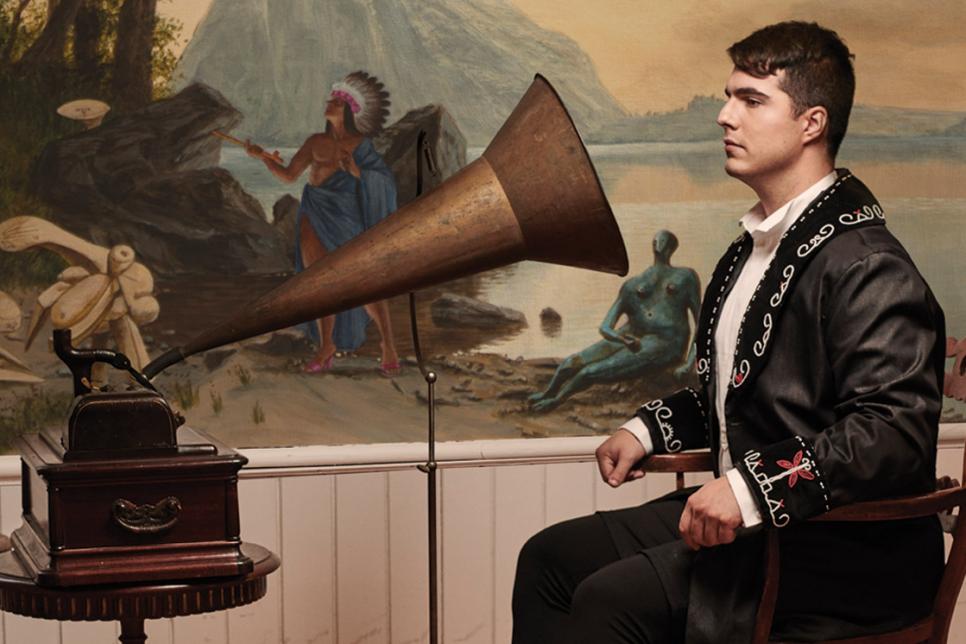Neuadd Ogwen, Bethesda, will be the first shared stage and the UK premiere for the young and highly-praised singer Jeremy Dutcher, who won Canada’s acclaimed Polaris Prize in 2018 as well as the Indigenous album of the year at the notable 2019 Juno awards.
A tribute to his near extinct language and the impact of colonialism, the 28 year old’s debut album, Wolastoqiyik Lintuwakonawa, is a post-classical, electro-jazz homage to his people, the Wolastoqiyik Tobique First Nation in New Brunswick Canada.
The haunting operatic masterpiece reinterprets century-old wax cylinder recordings of traditional songs in the Wolastoqey language.
The concert and the afternoon workshop on Friday 12 April 2019 are part of the UNESCO Year of Indigenous Languages in Wales and are programmed by Wales Arts International and Arts Council of Wales on behalf of Welsh Government’s Cymraeg 2050 team.
The town of Bethesda in north Wales is more than familiar with the language of music and politics. Home to some of Wales’ leading musicians, including Gruff Rhys, Lisa Jên of 9Bach and Lleuwen Steffan, the Ogwen valley’s history has been shaped by the language, culture and politics of the surrounding slate quarries and colonial landowners.
Looking forward to the concert, Minister for International Relations and the Welsh Language Eluned Morgan said:
“I’m thrilled that Bethesda will premiere Jeremy Dutcher in the UK, especially as we celebrate the UNESCO Year of Indigenous Languages. Bethesda is a fitting cultural setting as a stronghold of the Welsh language and home to many of our best Welsh language contemporary singers over many decades.”
9Bach Noeth will be supporting Jeremy Dutcher, and their singer Lisa Jên will join him in conversation with National Poet Ifor ap Glyn at a workshop for artists, programmers and policy makers before the concert. Lisa Jên said:
“Language is a gift. It is the greatest gift we can give our children, carrying as it does a profound legacy of culture, ancestral understanding and connection to the land. Each time a language dies, humanity is robbed of an inheritance of wisdom and cultural diversity - that which makes us resilient, that stuff that makes us human.”
Lisa Jên’s Mamiaith-Mother Tongue collaboration with leading indigenous singers from Australia as part of the Cultural Olympiad in 2012 was a life-changing moment for the musician as well as for Welsh language and folk music in Wales.
Neuadd Ogwen‘s Manager, Dilwyn Llwyd, who booked Jeremy Dutcher at WOMEX World Music Expo in Las Palmas in 2018 said
“I am over the moon that we in Neuadd Ogwen have the privilege of premiering Jeremy Dutcher in the UK. He is an incredible artist who plays to people’s sense of justice. He shares stories and traditions of oppressed peoples and languages the world over in a very powerful melancholic, yet uplifting way. It will be a real treat for great music lovers and those who care about cultural diversity in a post-colonial world.”
This is the latest UNESCO campaign in Wales. The slate quarries of Gwynedd are making a bid to become a World Heritage Site with the support of both the UK and Welsh Government.
END 5 April 2019
Notes to editors:
Jeremy Dutcher’s second concert will be in the Riverfront, Newport on Saturday 13 April.
The concert and workshop are part of the UNESCO Year of Indigenous Languages in Wales and are programmed by Wales Arts International and Arts Council of Wales on behalf of Welsh Government’s Cymraeg 2050 team.
The first of a series of public events, Mamiaith is an afternoon workshop with musicians and poets from Wales and Canada, who take their indigenous languages to international stages. The workshop aims to stimulate cooperation, raise awareness and celebrate of the value of indigenous languages and will also support presenters and artists and cultural operators in Wales to connect and develop activity to celebrate this special year.
Jeremy Dutcher’s mother-tongue, the Wolastoqey language, is only spoken by 100 people. He is leading a movement of indigenous artists leading a campaign for recognition and reconciliation between cultures.
In 2016, 40 per cent of the estimated 6,700 languages spoken around the world were in danger of disappearing. It catalysed the UN to designate 2019 the International Year of Indigenous Language, which is being led by UNESCO.

